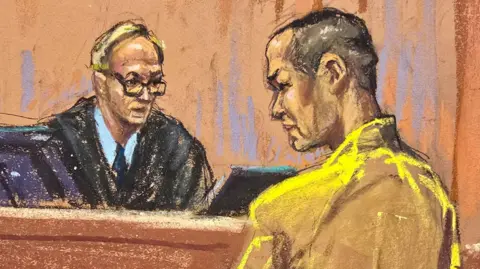In a landmark case that has rippled through the world of cryptocurrency, Do Kwon, the former CEO of Singapore-based Terraform Labs, recently pleaded guilty to fraud charges related to the collapse of two major cryptocurrencies, TerraUSD and Luna. This proceeding took place in a New York court and marks a significant turning point for both Kwon and the broader cryptocurrency community. Kwon’s actions, which led to a staggering loss of approximately $40 billion (£31.8 billion) for investors, have been described as a pivotal moment that sparked a wider crisis in the cryptocurrency market.
Kwon, who oversaw the operations of Terraform Labs, faced serious allegations from U.S. prosecutors, who accused him of orchestrating a multi-billion-dollar securities fraud regarding the digital currencies that the company operated. The plea entered by Kwon marked the conclusion of a prolonged legal battle that began after he attempted to evade authorities. Following the issuance of an arrest warrant in South Korea in 2023, Kwon fled the country. He was apprehended in Montenegro, shortly thereafter extradited to the United States to face the fraud charges.
As part of his plea deal, the prosecutors have agreed not to seek a sentence longer than 12 years for Kwon, who is set to be sentenced on December 11. Initially facing up to 135 years in prison had he been convicted of a total of nine separate counts, including securities fraud and conspiracy to commit money laundering, Kwon’s guilty plea has significantly abridged his potential punishment. He will also need to forfeit assets worth up to $19.3 million plus interest and additional properties, alongside paying restitution to his victims.
Intriguingly, the accusations leveled against Kwon centered on the misrepresentation of the functionalities of the stablecoin TerraUSD. Prosecutors stated that Kwon had falsely claimed that a robust algorithm—specifically, the Terra Protocol—was maintaining the token’s value at $1 without external aid. In reality, he allegedly arranged for a trading firm to covertly purchase millions of dollars of the token to artificially restore its value, thus misleading investors and manipulating the market.
The catastrophic collapse of both TerraUSD and Luna sent shockwaves throughout the cryptocurrency sector, instigating a broader sell-off that ensnared various other digital asset ventures. Kwon’s admissions during the court proceedings were unequivocal; he stated, “In 2021, I made false and misleading statements about why [TerraUSD] regained its peg,” acknowledging the unethical nature of his conduct. He extended an apology for his actions, indicating a level of contrition that may have influenced the leniency of his plea agreement.
Despite the detention and legal proceedings in the United States, Kwon’s legal woes are not entirely resolved. He still faces charges in South Korea that could present further complications for him. According to Kwon’s attorney, these ongoing proceedings could lead to additional legal consequences that might be beyond the scope of his current plea deal.
The overall situation surrounding Do Kwon serves as a cautionary tale within the cryptocurrency space, illustrating the potential risks associated with digital asset investments and the regulatory scrutiny that follows high-profile failures. Kwon’s story is not just about one man’s fall from grace; it reflects the burgeoning yet fragile nature of the cryptocurrency market and the implications of fraudulent activities that can devastate investor trust and market integrity. As regulators continue to dig into the intricacies of digital currencies, cases like Kwon’s may assist in shaping future legislation and compliance measures necessary to protect investors.










